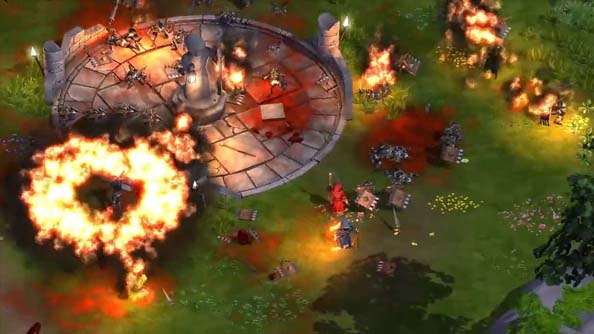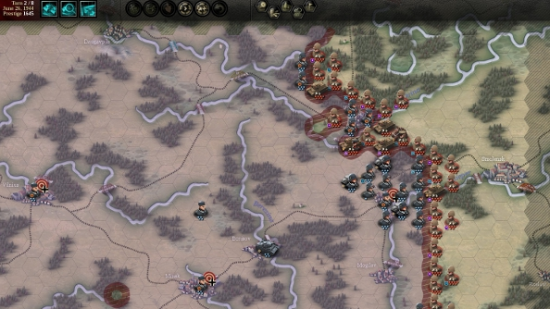It’s the first Sunday of Lent, hunger scrapes at your fasting body. Scrabbling around for games to distract you find that your mind can’t concentrate without sustenance. Thankfully you don’t need to think for yourself, you just need to point randomly at one of the games in the list below and copy what we’ve been enjoying playing this past week.
Rob Zacny: Unity of Command: Red Turn
Unity of Command’s expansion, The Red Turn, is all about the Soviets’ advance against the German army in the years following the conclusion of the Stalingrad defense and counterattack. Now you’d think that having lost an entire army at Stalingrad, and having taken a pounding trying to hold back the Soviet advance through that winter, the Germans might be a little weak and outmanned. But I’ll tell you, playing The Red Turn sure makes me feel like my legions of Soviet tanks and infantry are the underdogs in every fight.
In fact, some of the scenarios feel so lopsided and overmatched that I came within a whisker of rage-quitting the game. After the first mission, I was hit with two scenarios that seemed borderline impossible, within nothing to do but make repeated attempts while I tried to figure out exactly how the scenario designer meant for players to solve this puzzle. It’s one of my least favorite things to do in wargaming.
Past that early difficulty spike, however, The Red Turn went back to being the Unity of Command that I know and love. The trick, I’ve found, is that beating the Germans requires a delicate combination of overwhelming head-on assaults, which cost massive casualties but are sometimes the only way to whittle down elite German units, and a sort of slow-motion blitzkrieg where you slowly encircle German positions in order to deprive them of supply.
It’s a very different way to play from the earlier game, where you spent much of the game husbanding your resources and sending Wehrmacht armored forces sprinting across the countryside, outmaneuvering the sluggish Soviets at will. The Red Turn is about using Russian numbers to pin the Germans in place and force them to choose between spreading out, being encircled, or retreating. But opening those opportunities still requires a lot of dead Soviet troops, and a cold-blooded profligacy that is likely repugnant to those of us more accustomed to commanding Western-style armies, or carefully leveling up our forces in Total War. While I still think The Red Turn has some issues with scenario design, by and large I’m loving the mental shift it’s required of me.
Paul Dean: Magicka

I hadn’t touched Magicka in nearly a year, but something pulled me back to it this week. It might well have been all that talk about Paradox, such as Rob’s Paradox Con roundup, or he and (the quite evil) Joe’s look at Europa Universalis IV. Magicka was one of the studio’s greatest successes but also one of its most notoriously imperfect games. Though I played it a hell of a lot, I also experienced my fair share of frustration while doing so.
Playing again this week, that’s been no different. Magicka’s core concept, that of making spells by mixing together eight different spellcasting elements, is a great one. Combine water and ice, for example, and you can launch a spray of deadly icicles, or mixing fire and rock has you hurling brimstone. There are hundreds of possibilities and I’m still discovering new combinations. Just the other day I came up with what are essentially ice magic land mines, charges that sit in the ground until someone steps over them, throwing the unsuspecting victim into the air and freezing them at the same time.
I also struggled to make much more progress in the single player campaign, thanks due to a silly bug during a certain boss battle, and I forgot how difficult it could be to see my own health bar or even where I myself was during a fight, thanks to map features or overcrowding obscuring where my poor magician was standing.
Still, I had a lot of fun enjoying myself in this spellcasting sandbox, pushing the campaign aside and simply playing challenge mode after challenge mode, fighting back monsters in the game’s various horde modes. Now what I’d really like to do is try all this in multiplayer, but Jeremy, Julian and I struggled with this a little while back and I’ve not yet been able to join, or even find, any games that my friends insist they have been hosting. Maybe next week. The only thing more varied and unpredictable than Magicka’s magic is its bugs.
Julian Benson: Synergy
Any game that has you play as an entity representing all of mankind and then has you spoil the ground as you walk across it gets my vote. If it’s a puzzle platformer, well that’s all for the good. Synergy does both these things, taxing your mind with simple problems and all the while conveying the message that mankind is destroying the earth but we can work to heal it too.
The aim of each level is simple, get from one side of the level to the end point without stepping on anything green, if you touch plantlife it dies. It’s not the end of the world if you do, though. There are certain points across each level which when you step on it will emanate a regenerating wave in a horizontal or vertical line. So, if you step carefully and plan your route then you can undo any damage you do to the level’s fauna as you go.
Starting simply, Synergy adds in new mechanics pretty regularly which begins adding in some devilish bits of platforming too.
I’ve been playing a press copy but Synergy is due out later this month (no set date yet). There’s also a Kickstarter currently on the go to port the game to Android devices. You can learn more about the game over yonder.
